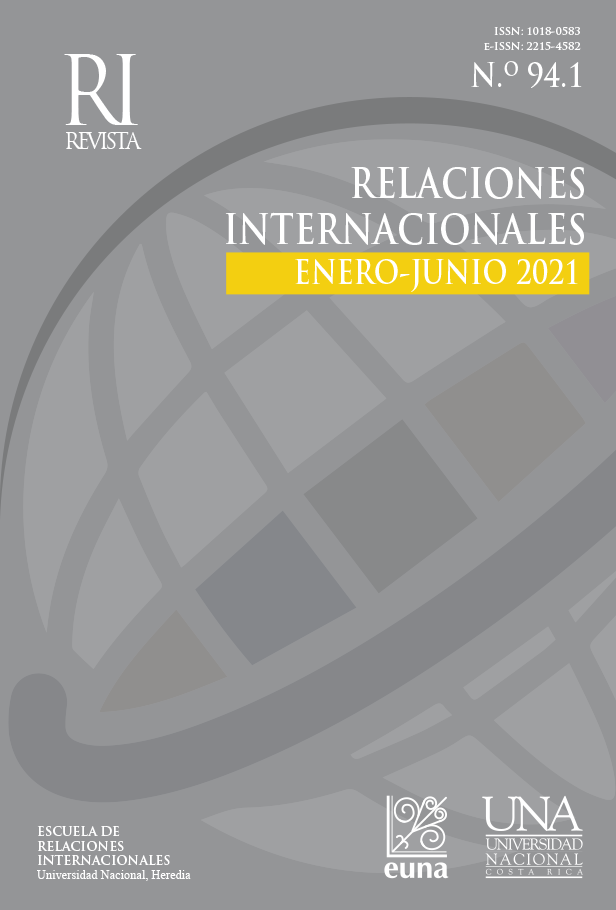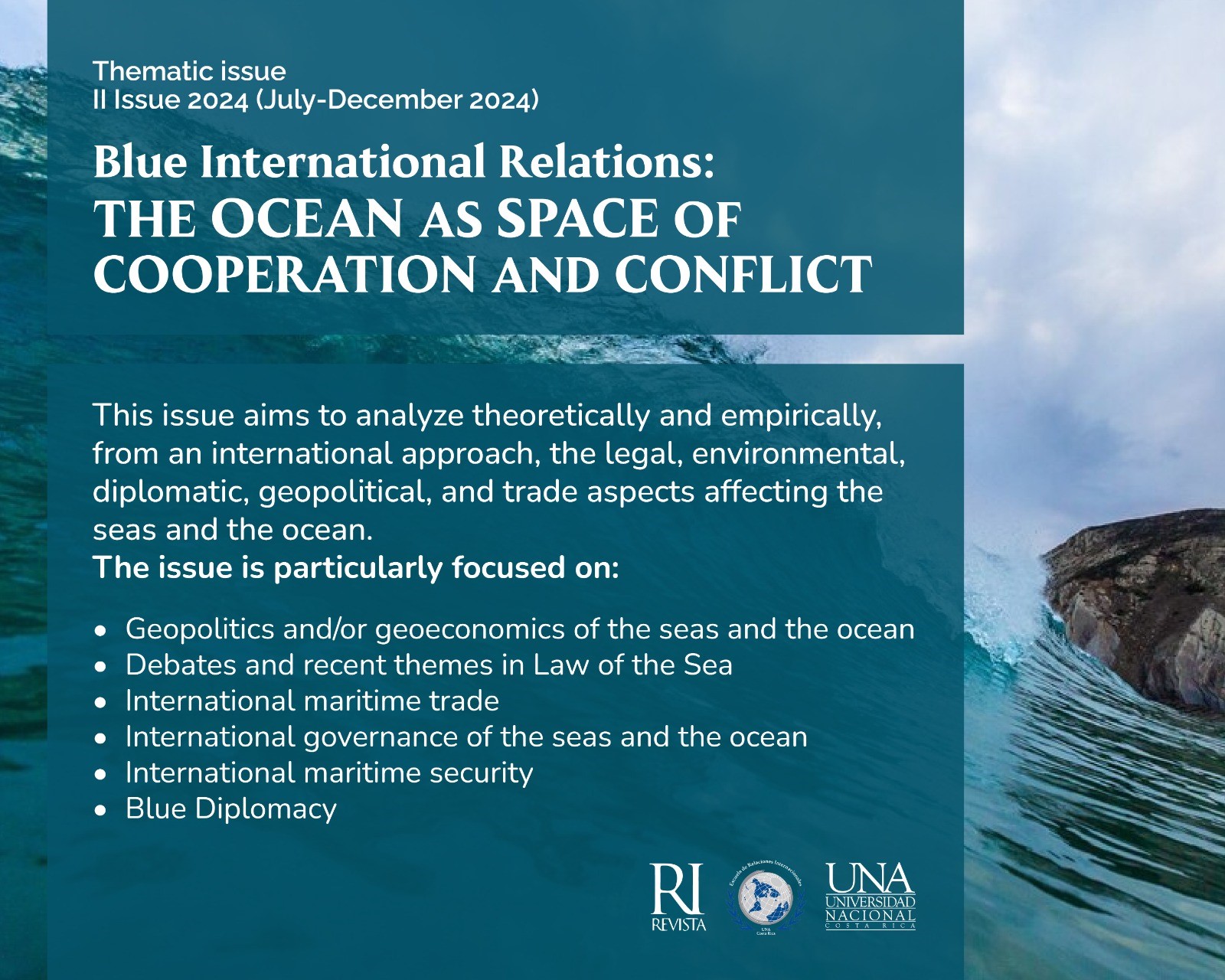The Foreign Policy of the United States Towards Brazil: Changes and Continuities in Biden's Administration
DOI:
https://doi.org/10.15359/ri.94-1.7Keywords:
Brazil, Donald Trump, Foreign Policy, Jair Bolsonaro, Joseph Biden, United StatesAbstract
During his first two years as president of Brazil, Jair Bolsonaro gave the relationship with the United States the highest priority, achieving an extraordinary understanding with President Donald Trump. However, the arrival of Joseph Biden to the presidency has had a significant impact on that understanding. Here it is shown that the Brazilian-American relations with Presidents Trump and Bolsonaro were framed in their populist government programs and that they were driven by their mutual personal understanding, altering the priorities (but not the content) of the bilateral agenda. The arrival of Biden and his ideological distancing from Bolsonaro does not necessarily imply a cooling in the bilateral relationship, but rather a redirection to institutional channels thanks to the pre-existing mechanisms between the United States and Brazil, as well as a return to historical priorities: economic affairs first, then energy and environmental issues, later military cooperation and finally social topics. In this research, the deductive methodology has been implemented in the study of two dimensions: a discursive one, by examining the most important official speeches of Trump, Bolsonaro and Biden in Brazilian-American relations, with the aim of identifying changes in their perceptions and priorities; and another historical one, when studying the performance of bilateral institutions in the aforementioned areas, in order to detect continuity patterns that go beyond presidential administrations.
References
Americas Quarterly. (2020). Joe Biden Answers 10 Questions on Latin America. Recuperado el dic. de 2020, de Americas Quarterly: https://www.americasquarterly.org/article/updated-2020-candidates-answer-10-questions-on-latin-america/
Biden, J. (2013). Remarks by the Vice President on U.S.-Brazil Relations, Rio de Janeiro, Brazil. Recuperado el 2021, de The White House - President Barack Obama: http://bit.ly/355ZyZj
Bodman, S., Wolfersohn, J., & Sweig, J. (2011). Independent Task Force Report No. 66. New York: Council on Foreign Relations.
Bolsonaro, J. M. (2020). O que alguns ainda não entenderam é que o Brasil mudou... Recuperado el 2021, de Twitter: https://twitter.com/jairbolsonaro/status/1311325732866588678
Briceño, J. (2016). Del Panamericanismo al ALCA: la difícil senda de las propuestas de una comunidad de intereses en el continente americano (I). Anuario Latinoamericano, 3, 145-167. doi:10.17951/al.2016.3.145
Briceño, J. (2017). Del panamericanismo al ALCA: la difícil senda de las propuestas de una comunidad de intereses en el continente americano (II). Anuario Latinoamericano, 4, 139-162. doi:10.17951/al.2017.4.139
Burns, B. (1966). The Unwritten Alliance. Rio Branco and Brazilian-American Relations. New York: Columbia University Press.
Caballero, S. & Crescentino, D. (2020). From the quest for autonomy to the dual break: structural and agential changes in Brazil’s foreign policy during the 21st century. Revista Brasileira de Política Internacional, 63(1), 1-20. doi:10.1590/0034-7329202000111
Cardoso, F. H., Nunes, A., Amorim, C., Lafer, C., Resek, F., Serra, J., . . . Kalout, H. (2020). La reconstrucción de la política exterior brasileña. Recuperado el feb. de 2021, de Nodal: https://bit.ly/3iSget9
Chryssogelos, A. (2017). Populism in Foreign Policy. Recuperado el feb. de 2021, de Oxford Research Encyclopedia of Politics: https://doi.org/10.1093/acrefore/9780190228637.013.467
Committee on Ways and Means. (2020). Ways and Means Democrats Strongly Oppose Expanding Economic Relations with President Bolsonaro’s Brazil. Recuperado el feb. de 2021, de Richard Neal - Serving Massachusetts' 1st District: https://bit.ly/3td6wWY
Cooper, A., & Antkiewicz, A. (2008). Emerging power in global governance. Ontario: Wilfrid Laurier University Press.
Correa, J. (2020). Panamericanismo versus latinoamericanismo: tensión geopolítica y civilizacional. Analecta Política, 10(19), 56-76. doi:10.18566/apolit.v10n19.a03
D’Araújo, M. C. (s.f.). Acordo Militar Brasil-Estados Unidos (1952). Recuperado el 2021, de https://bit.ly/34yqiB6
Destradi, S., & Plagemann, J. (2019). Populism and International Relations: (Un)predictability, personalisation, and the reinforcement of existing trends in world politics. Review of International Studies, 45(5), 711-730. doi:10.1017/S0260210519000184
Embaixada do Brasil em Washington. (2018). Desafios e oportunidades à exportação de produtos brasileiros aos Estados Unidos. Recuperado el feb. de 2021, de Subsecretaria Geral do Serviço Exterior: https://bit.ly/3pwcSyt
Fonseca, P., Paes, L., & Cunha, A. (2016). The concept of emerging power in international politics and economy. Revista de Economia Política, 36(1 (142)), 46-69. doi:10.1590/0101-31572016v36n01a04
Frenkel, A. (2018). El mundo según Bolsonaro. La nueva política exterior de Brasil. Recuperado el 2021, de Nueva Sociedad: http://bit.ly/3ocrfY8
Government of the United States of America and the Government of the Federative Republic of Brazil. (2011). Agreement on Trade and Economic Cooperation between the Government of the United States of America and the Government of the Federative Republic of Brazil. Recuperado el feb. de 2021, de The Withe House - President Barack Obama: https://bit.ly/2Yq0nZk
Government of the United States of America and the Government of the Federative Republic of Brazil. (2020). Protocol to the Agreement on Trade and Economic Cooperation between Government of the United States of America and the Government of the Federative Republic of Brazil relating to trade rules and transparency. Recuperado el feb. de 2021, de Office of the United States Trade Representative: https://bit.ly/39xM2R1
Gratius, S. (2008). Las potencias emergentes: ¿estabilizadoras o desestabilizadoras? Recuperado el jun. de 2018, de FRIDE: http://www.fride.org/download/COM_Potencias_emergentes_ESP_abr08.pdf
Hakim, P. (2019). Remaking US-Brazilian Relations: The Odyssey of Trump and Bolsonaro. Recuperado el feb. de 2021, de The Dialogue: http://bit.ly/3ctjGJt
Hurrell, A. (2012). Récits d'émergence: la fin du tiers monde? Critique internationale, 3(56), 17-38.
Mongan, M. (2020). Descifrando la política externa bolsonarista. Recuperado el feb. de 2021, de Foreign Affairs Latinoamérica: http://revistafal.com/descifrando-la-politica-externa-bolsonarista/
Morales, D. (2020). The semiperipheral States in the 21st century: Measuring the structural position of regional powers and secondary regional states. International Studies, 57(1), 20-50. doi:10.1177/0020881719880769
Neto, A., Godinho, D., Hyatt, K., & Schineller, L. (2020). Comércio e investimentos Brasil-EUA: Aprofundando as Relações Econômicas Bilaterais. Recuperado el feb. de 2021, de Atlantic Council: https://bit.ly/39ympj2
Nolte, D. (octubre de 2006). Potencias regionales en la política internacional: conceptos y enfoques de análisis. Recuperado el septiembre de 2014, de German Institute of Global and Area Studies: http://www.giga-hamburg.de/de/system/files/publications/wp30_nolte.pdf
Office of the Spokesperson. (2019a). U.S.-Brazil Strategic Partnership Dialogue. Recuperado el feb. de 2021, de U.S. Embassy & Consulates in Brazil: https://bit.ly/36xsASB
Office of the Spokesperson. (2019b). Secretary Michael R. Pompeo And Brazilian Foreign Minister Ernesto Araujo Remarks to the Press. Recuperado el feb. de 2021, de U.S. Embassy & Consulates in Brazil: https://bit.ly/3j3kmXr
Padilla, E. (1954). The Meaning of Pan-Americanism. Foreign Affairs, 270-281.
Presidência da República. (1953). Decreto n° 33.044. Recuperado el may. de 2021, de https://bit.ly/3vI5GTa
Presidência da República. (1977). Decreto n° 79.376. Recuperado el may. de 2021, de https://bit.ly/3vDKKN1
Ribeiro Hoffmann, A. (2020). Brazil Under Bolsonaro. Latin American Policy, 11(3), 335-338. doi:10.1111/lamp.12200
Rocha, A., & Morales, D. (2018). El poder nacional-internacional de los Estados. Una propuesta trans-estructural. Geopolítica(s), 9(1), 137-169. doi:10.5209/GEOP.57778
Runde, D., & Kohan, A. (2021). Toward a Brazil–U.S. Binational Institution. Recuperado el feb. de 2021, de Center fro Strategic & International Studies: http://bit.ly/3oXnAgw
Saraiva, M. (2012). Procesos de integración de América del Sur y el papel de Brasil: los casos del Mercosur y la Unasur. Revista CIDOB d'Afers Internacionals, 97/98, 87-100. Obtenido de http://www.jstor.org/stable/41635272
Saraiva, M., & Silva, Á. (2019). Ideologia e pragmatismo na política externa de Jair Bolsonaro. Relações Internacionais(64), 117-137. doi:10.23906/ri2019.64a08
Scholvin, S. (2010). Emerging non-OECD countries: global shifts in power and geopolitical regionalization. Hamburg: GIGA German Institute of Global and Area Studies.
Schweller, R. (2011). Emerging powers in an age of disorder. Global Governance, 17, 285-297.
Soares de Lima, M. R., & Hirst, M. (2006). Brazil as an intermediate state and regional power: action, choice and responsibilities. International Affairs, 82(1), 21-40.
Soreanu, C. (2008). As relações bilaterais Brasil-Estados Unidos (1989-2008). Nueva Sociedad, 86-103. Obtenido de https://bit.ly/3t56BMz
The White House. (2019a). Remarks by President Trump and President Bolsonaro of the Federative Republic of Brazil in Joint Press Conference. Recuperado el 2021, de The White House - National Archives: http://bit.ly/368Yswp
The White House. (2019b). Designation of the Federative Republic of Brazil as a Major Non-NATO Ally. Recuperado el 2021, de Federal Register: http://bit.ly/3pME7VO
The White House. (2021). Executive Order on Tackling the Climate Crisis at Home and Abroad. Retrieved feb. 2021, from The White House - Briefing Room: http://bit.ly/36wt0IK
U.S. Department of State. (2009). United States-Brazil Economic Partnership Dialogue. Recuperado el feb. de 2021, de U.S. Department of State - Archive: http://bit.ly/3aorqtA
U.S. Department of State. (2011). U.S.-Brazil Global Partnership Dialogue. Recuperado el feb. de 2021, de U.S. Department of State - Archive: http://bit.ly/3ti8PYL
U.S.-Brazil CEO Forum. (2020). Joint Communique from the U.S.-Brazil CEO Forum. Retrieved feb. 2021, from U.S. Department of Commerce: http://bit.ly/2YrFPjl
U.S.-Brazil Commercial Dialogue. (2020). Joint Statement of the 18th Edition of the U.S.-Brazil Commercial Dialogue. Retrieved feb. 2021, from International Trade Administration - U.S. Department of Commerce: http://bit.ly/2L1bm8s
Villarreal, A., Meyes, P., & Schwarzenberg, A. (2020). U.S.-Brazil Economic Relations. Recuperado el feb. de 2021, de Congressional Research Service: https://bit.ly/3j4S12J
Viscidi, L., & Graham, N. (2019). Brazil Was a Global Leader on Climate Change. Now It’s a Threat. Recuperado el feb. de 2021, de Foreign Policy: http://bit.ly/3ctyJmp
Wehner, L., & Thies, C. (2020). The nexus of populism and foreign policy: The case of Latin America. International Relations, 1-21. doi:10.1177/0047117820944430
Zakol, A. (2019). ‘Rise of the rest’: As hype and reality. International Relations, 1-16. doi:10.1177/0047117819840793
Published
How to Cite
Issue
Section
License

Revista de Relaciones Internacionales por Universidad Nacional de Costa Rica está bajo una Licencia Creative Commons Atribución-NoComercial-SinDerivar 4.0 Internacional








1.png)







3.png)
